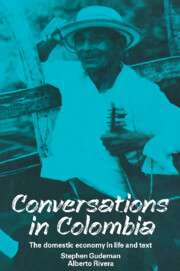10 - FROM HOUSE TO CORPS
Published online by Cambridge University Press: 03 October 2009
Summary
The conversation from Colombia is unfinished; much remains to be said by the rural folk and by us. But our purpose – to present the Colombian model of the house economy – has been mostly accomplished. We call this model a finding or discovery. Clearly, the idea of the domestic economy is not new, but a portrayal of the way it is practiced and voiced has, we think, some claim to originality; and we suggest that this is not without moment given the model's continuing presence in most rural areas of Latin America, its historical importance there and its genesis and original florescence in Europe.
The house is an institution of long standing, a kind of “infrastructure” that runs “underneath” and has been used within many economic forms: colonialism, imperialism, slavery, feudalism, seigneurial society, early capitalism, and others. To place the house economy in context today, we have used the triangular set of market, corporation, and house. The market now is home to the corporation; as markets have spread, so have corporations; and as markets become more specialized and marketing covers more spheres, so corporations multiply in number, deepen their capital, and grow ever larger. But markets also have seams and crevasses, boundaries and frontiers, and these marginal or liminal regions are today's home of the house economy and its many variants.
We think that this interplay between, or dialectical relation of, house and corporation has much to suggest for rethinking past and present economies.
- Type
- Chapter
- Information
- Conversations in ColombiaThe Domestic Economy in Life and Text, pp. 183 - 191Publisher: Cambridge University PressPrint publication year: 1990



